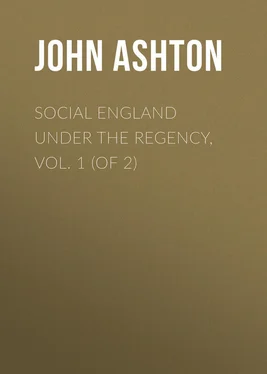John Ashton - Social England under the Regency, Vol. 1 (of 2)
Здесь есть возможность читать онлайн «John Ashton - Social England under the Regency, Vol. 1 (of 2)» — ознакомительный отрывок электронной книги совершенно бесплатно, а после прочтения отрывка купить полную версию. В некоторых случаях можно слушать аудио, скачать через торрент в формате fb2 и присутствует краткое содержание. Жанр: foreign_antique, foreign_prose, на английском языке. Описание произведения, (предисловие) а так же отзывы посетителей доступны на портале библиотеки ЛибКат.
- Название:Social England under the Regency, Vol. 1 (of 2)
- Автор:
- Жанр:
- Год:неизвестен
- ISBN:нет данных
- Рейтинг книги:4 / 5. Голосов: 1
-
Избранное:Добавить в избранное
- Отзывы:
-
Ваша оценка:
- 80
- 1
- 2
- 3
- 4
- 5
Social England under the Regency, Vol. 1 (of 2): краткое содержание, описание и аннотация
Предлагаем к чтению аннотацию, описание, краткое содержание или предисловие (зависит от того, что написал сам автор книги «Social England under the Regency, Vol. 1 (of 2)»). Если вы не нашли необходимую информацию о книге — напишите в комментариях, мы постараемся отыскать её.
Social England under the Regency, Vol. 1 (of 2) — читать онлайн ознакомительный отрывок
Ниже представлен текст книги, разбитый по страницам. Система сохранения места последней прочитанной страницы, позволяет с удобством читать онлайн бесплатно книгу «Social England under the Regency, Vol. 1 (of 2)», без необходимости каждый раз заново искать на чём Вы остановились. Поставьте закладку, и сможете в любой момент перейти на страницу, на которой закончили чтение.
Интервал:
Закладка:
John Ashton
Social England under the Regency, Vol. 1 (of 2)
Certainly, it is not the least part of an Author's reward, for all his pains and trouble, to find that the Public appreciates his efforts, and purchases, and reads his books.
This, I am happy to say, was specially the case with one of mine, "The Dawn of the Nineteenth Century." In it I wrote of Social England in the first decade of the century, leaving off at a time when George III. was hopelessly incompetent to govern, and a Regency was in progress of establishment.
The favour which the Public bestowed upon this book emboldens me to continue it, and sketch the men and manners of the Regency. Most books of this class deal mainly with the great ones of the land, but I have only done so where necessary to illustrate the history of the times, my aim being more to delineate the social condition of England, and her people; and this work will be found perfectly reliable as history, nothing being taken at second hand, but all compiled, even down to the illustrations, from original and contemporaneous authorities.
JOHN ASHTON.CHAPTER I
"Windsor Castle, January 1, 1811.
"His Majesty has passed a quiet night, without much sleep, and continues the same as he was yesterday.
"H. Halford. "W. Heberden. "R. Willis."Such was the announcement contained in The Times of 2nd of January, 1811, and, for some time, the subjects of George III. were fed with daily news of the King's health. By and by, as his mental disease was confirmed, they grew fewer, until they were furnished just once a month, and then only the very scantiest intelligence of his condition was vouchsafed to his people.
This was not the first time that his mind had given way. In the early part of October, 1788, he had decided symptoms of mental aberration, and was totally incapable of undertaking any of the affairs of State; but his physicians were hopeful of his recovery – and their hopes were gratified. But the Ministry thought differently, and, after suggesting that the Government should be carried on by a Commission, on the 30th of December, 1788, Pitt wrote a letter to the Prince of Wales, stating that his Majesty's Ministers had come to the conclusion to offer him the Regency of the kingdom under certain restrictions.
The Prince of Wales replied at once, expressing his sorrow at the occasion of his proposed elevation, but accepting the trust. Of course, this suggestion of the Government could not be acted upon without mature deliberation, and it was not until the 30th of January, 1789, that the following resolutions of the Lords and Commons were presented to the Prince of Wales – "That his Royal Highness be empowered to exercise the royal authority under the title of Regent." "That the power given, should not extend to the granting of any peerage, except to the Royal issue." "Nor to the grant of any office in reversion, or any office, salary, or pension, than during his Majesty's pleasure; or to the granting his Majesty's real or personal estates." "That the Care of his Majesty be committed to the Queen, who should nominate all persons to the offices in the household."
Needless to say, the Prince made no objections, and by the 12th of February, the Regency Bill had gone through all its stages in the House of Commons, and was ordered to be sent to the Lords. But the proverbial "slip 'twixt cup and lip" occurred. On the 19th of February the Lord Chancellor informed the House of Lords that, according to the report of his physicians, the King's health was steadily mending, and they therefore abstained from further consideration of the Regency Bill.
The physicians' hopes were fully justified; the King got better rapidly, and, on the 27th of February, his perfect recovery was announced, the prayer for the same was discontinued, and a form of prayer of thanksgiving for his restoration to health, was ordered to be read in all Churches and Chapels throughout England and Wales. Rejoicings and illuminations were the order of the day, and, on the 23rd of April, the day of general thanksgiving, the King, Queen, and Royal family went in state to St. Paul's Cathedral, to return thanks to God for his mercy in giving the King his reason and health once more.
Years went on, and the King did not suffer from mental disease, until the year 1810, when to bodily illness of his own, was added the death of his daughter, the Princess Amelia. This shock, his intellect, perhaps never too strong, could not stand, and, although his condition was concealed for some little time from the people – under the pretence that he had a cold – the truth was obliged to come out; and we read in The Morning Post of October 31st – "It is with heartfelt sorrow we announce that His Majesty's indisposition still continues. It commenced with the effect produced upon his tender parental feelings on receiving the ring 1 1 The Princess Amelia, when dying, ordered a valuable stone she possessed, to be set in a ring, for a keepsake of her to her father, and so urgent was she that it might be made before she died, that a jeweller was sent for, express, from London to make it. It contained a lock of her hair, and, on it, was her name, and, " Remember me when I am gone ."
from the hand of his afflicted beloved daughter, the affecting inscription upon which, caused him, blessed, and most amiable of men, to burst into tears, with the most heart-touching lamentations on the present state, and approaching dissolution of the afflicted and interesting Princess. His Majesty is attended by Drs. Halford, Heberden, and Baillie, who issue daily bulletins of the state of the virtuous and revered monarch, for whose speedy recovery the prayers of all good men will not fail to be offered up."
This time the Physicians held out no hopes of the King's recovery, or if they did, it was at some vague, indefinite future, the date of which none could prognosticate, and Parliament found itself in a serious situation. It met on the 1st of November, to which date it had been prorogued, only to find that there was no King to open the session, and no Commission for so doing had been named. So, in default of any other recognized authority, the Lord Chancellor, and the Speaker, took the lead in their different assemblies, and, after vainly trying to find out how they should act, an Order in Council cut the Gordian Knot, adjourning Parliament to the 29th of November, a decision which was confirmed in the House of Commons by a majority of 285. When they again met, they, after discoursing of the King, set to work to concoct a Regency.
But that may wait for a while, and come in its proper place, for King George is passing away from this history, and the full blaze of the Regency leaves very little room for the shadow of the old King to show: yet, before he disappears altogether, it may be as well if we can recall a reminiscence of him, as late as possible, before his sad malady overtook, and mastered him. Not in his public capacity, but as it were en famille , let us see him; and we get a good view of him through the medium of the Rev. John Evans, LL.D., of Islington, who wrote "An excursion to Windsor," and thus describes what he saw on the 10th of July, 1810: —
"We entered Windsor about six o'clock, and, having refreshed ourselves at the inn with a cup of tea, hastened to The Terrace , where we found a considerable portion of genteel company. Intent on the gratification of a laudable curiosity, we felt peculiarly happy in joining them on this occasion. It was seven o'clock, and the good old King soon made his appearance with his accustomed punctuality.
Читать дальшеИнтервал:
Закладка:
Похожие книги на «Social England under the Regency, Vol. 1 (of 2)»
Представляем Вашему вниманию похожие книги на «Social England under the Regency, Vol. 1 (of 2)» списком для выбора. Мы отобрали схожую по названию и смыслу литературу в надежде предоставить читателям больше вариантов отыскать новые, интересные, ещё непрочитанные произведения.
Обсуждение, отзывы о книге «Social England under the Regency, Vol. 1 (of 2)» и просто собственные мнения читателей. Оставьте ваши комментарии, напишите, что Вы думаете о произведении, его смысле или главных героях. Укажите что конкретно понравилось, а что нет, и почему Вы так считаете.












